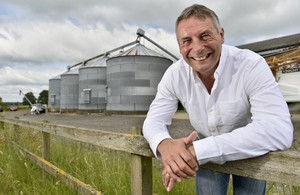Saving crops: new technology harnesses nature to protect harvests
Hampshire company, Exosect, develops an effective treatment to protect stored grain against infestation, with support from Innovate UK.

Phil Harris, Exosect's Chief Administration Officer
Loss of crops in storage after harvesting makes food shortages worse and contributes to rising food prices. These are two of the most critical issues facing the world today.
The World Bank estimates that total annual losses for grain in storage in sub-Saharan Africa amount to $4 billion US dollars - more than the total value of food aid delivered to the region over the last decade.
Insect and mite infestation is a particular challenge. Traditionally, it’s been treated with chemicals and fumigants. But with the number of insecticides approved for use in the EU and around the world falling, insect species may develop greater resistance, which could make losses even worse.
Hampshire based company, Exosect, received a £270,000 grant from Innovate UK to develop a safe and effective treatment to protect grain in storage against infestation.
They came up with a wax micro powder called Entostat, which acts as a delivery system for anti-insect fungi found naturally in UK farm grain stores.
Harnessing nature
Entostat uses an innovative micro powder technology that mimics the fine wax particles on the surface of carnivorous plants. The result is a naturally occurring biological pest control agent derived from a fungus found in grain stores.
“The technology works really well. It’s simple and it harnesses nature - using fungal spores that have been around for millennia and whose purpose in life is to feed off insects,” said Phil Harris, Exosect’s Chief Administration Officer.
The technology is a spin-off from a discovery made by a professor of entomology at Southampton University, who found that tiny wax particles on the inside of carnivorous pitcher plants adhere to insects via electrostatic attraction.
While the formulation has been many years in the making, the potential rewards are considerable.
The global market for insecticides used in grain storage alone is estimated to be over £90 million per year - and this is only one of many areas where the technology could be used.
“It has the potential to cover a wide range of staple crops and commodities such as rice, cocoa beans, pulses or animal feed,” said Georgina Donovan, Exosect’s Communications Manager.
“Innovate UK funding has been instrumental in developing the biological aspect of our business so we can access this major growth market in the agricultural sector.
“We can see the beginnings of markets for our technology in other sectors like public health and animal health as well so the timing couldn’t be better.”
Attracting attention
Exosect has received funding from the Bill & Melinda Gates Foundation to explore ways of helping subsistence farmers to protect grain in sub-Saharan Africa.
The Australian Grains Research and Development Council has also provided funding to research its uses in storage after harvest.
“We have a formulation with an extremely low environmental impact and high efficiency at a time when regulators are taking other insecticides off the market,” said Martin Brown, CEO of Exosect.
“We can show partners and investors we’ve done the ground work on commercialisation, including protection for the technology itself.”
The company has also received venture capital funding from three British funds, one Dutch fund and a range of individuals, as well as support from the Department for Environment, Food and Rural Affairs (DEFRA).
However, Phil Harris is keen to stress the importance of Innovate UK support:
“It gives the technology credibility, which is critical for a relatively small company like us.”
Protecting the future
Exosect’s CEO Martin Brown emphasised the importance of intellectual property protection when taking the product to market:
“As a small company we don’t have the capacity to launch a product in the marketplace on a global scale. We’re looking to license our technology and are seeking licensing and commercial partners - initially focusing on Europe and the US.
“Getting to this stage is the culmination of nine years’ work. If it wasn’t for the long-term vision of Innovate UK and the other funders we wouldn’t have got anywhere near as far as we have.”